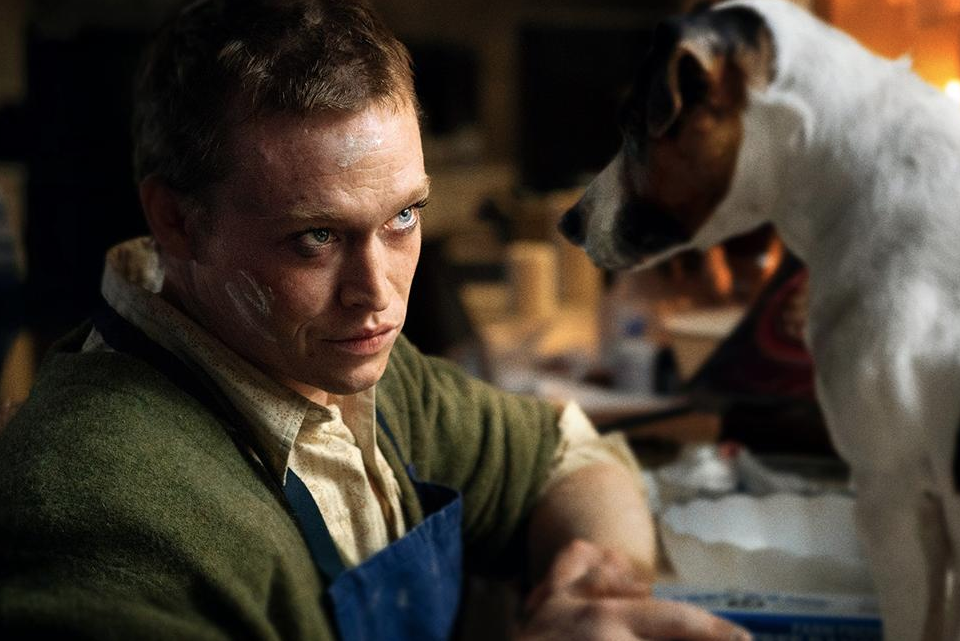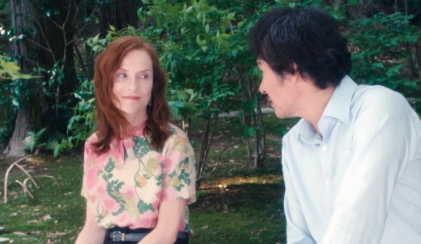Venice 2023: The latest films from Luc Besson and Isabelle Huppert
 Friday, September 1, 2023 at 9:00PM
Friday, September 1, 2023 at 9:00PM by Elisa Giudici
 Caleb Landry Jones in "Dogman"
Caleb Landry Jones in "Dogman"
We seem to have a new Joker on our hands, or at the very least, a new contender like The Whale, I'm afraid. To be fully transparent, I despised the former and adored the latter. Luc Besson's Dogman treads toward a similar future: it will deeply move some audience members and prompt visceral aversion in the others...
DOGMAN by Luc Besson
Visually, Dogman is a beauty to behold. Besson, a skilled director, possesses a keen understanding of composition. He wields bold colors adeptly, orchestrates dynamic scenes, and masterfully captures the raw emotions etched across an actor's face. His approach carries a distinct 90's directing vibe, which pays off splendidly. Another of the film's standout facets is the compelling and intense lead performance from Caleb Landry Jones. If the international press doesn't cast a shadow on the movie, he stands a strong chance of becoming a frontrunner in the Oscar race and vying for the Coppa Volpi.
Regrettably, despite visual prowess and an exceptional performance, Dogman's Achilles' heel lies in the script. Between its philosophical underpinnings and its messaging. Every element is so excessively simplified that its overtly reductive.
Dogman can be likened to the cinematic equivalent of the phrase "dogs are better than people," a sentiment expressed by the protagonist. Could there be truth in such a statement? Conceivably, but its potency is solely rooted in its familiar platitude. Besson manipulates the audience's emotions through his male lead — a cross-dressing individual bound to a wheelchair, grappling with the most traumatic childhood experience. Firmly convinced that dogs are superior to humans, he veers toward murder, yet surprisingly doesn't harbor resentment toward the mother who abandoned him to save herself. Despite his deep bond with dogs, he never questions whether it's appropriate to employ them as vehicles for his revenge, and puts them in danger. The film's philosophy rests on catchphrases, lacking any genuinely punk or anarchic elements. The central character vacillates between being a serial killer and a savior based on the circumstances, a contradiction that's hard to ignore.
The movie is also quite cluttered in its narrative. It presents itself as a queer tale of crime (though it doesn't embody queerness), a chronicle of a despairing life, and a '90s-style thriller in which a psychologist gradually unravels her patient's story, unveiling accusations one by one, revelation after revelation. It's intriguing to note that the closing shot fixates on Doug's legs, reminiscent of The Whale.
One of the core issue's in my resistance is that we've already encountered a superior rendition, a genuinely radical alternative to this film: Kornél Mundruczó's White God. In an era when a segment of the audience gravitates toward simplistic solutions for complex problems and stark black-and-white characterizations, Besson's latest work might very well enjoy commercial success.
 Isabelle Huppert in "Sidonie in Japan"
Isabelle Huppert in "Sidonie in Japan"
SIDONIE IN JAPAN by Elise Girard
While I have a plethora of captivating details and insights to share about this movie, it's essential to keep one notion in mind: it's a challenging and endurance-test experience. Personally, even while eagerly awaiting the final scene, I found myself quite enamored. Yet again Isabelle Huppert presents another cinematic puzzle for her devoted fans.
The narrative centers around Sidonie, a French writer who has endured the profound loss of her loved ones twice in her life. After the sense of loss left nothing inside her, she survived by forging a path as a renowned writer. Now a widow, she resides in the realm of her loneliness, her creative wellspring seemingly dried up. A letter from her Japanese editor tugs at her heartstrings and persuades her to embark on a journey to Japan, the very first in her life. This foreign land overwhelms her senses with its constant novelty—a familiar yet distinct departure from European shores.
Girard skillfully captures the essence of cultural otherness that envelops those experiencing Asia for the first time through Western eyes. The film struck me particularly with its portrayal of the unique solitude that sometimes accompanies globetrotting—from hotel to hotel, grappling with unfamiliar languages, within luxurious yet unfamiliar chambers that transiently become home. Noteworthy is a scene that beautifully exemplifies the fusion of French and Japanese culture: Sidonie, gripped by trepidation, communicates her plea for assistance talking slowly in French, to which the hotel manager responds in the very same way but in Japanese. Very accurate, quite funny.
"Sidonie au Japon" serves as a delicate exploration of love's rekindling and a peculiar ghostly narrative. After all, "Japan is the land in which phantoms and the livings share the world." The film invites us to invest time and patience in deciphering the narrative's deeper layers, revealing how the sense of loss bridges connections—among lovers and readers alike. The central message resonates: sometimes, we must embrace our losses to rediscover life's vibrancy.
Isabelle Huppert thrives in her role, embodying a strong, self-reliant woman who's grappled with familial loss (thankfully, no mass homicides this time). She shines alongside Tsuyoshi Ihara, who skillfully portrays a distinct masculinity, tackling his lines in French adorned with a thick Japanese accent throughout.
Girard's directorial decisions intrigue, particularly the juxtaposition between Sidonie and the spectral apparitions she encounters, each illuminated by a markedly different photography style. The film also offers an intriguingly intimate moment—a scene conveyed solely through photographs of naked body parts. Yet, it's an exercise in unhurried pacing, devoid of clamor, deliberately shunning even the faintest sense of haste. Such is its stillness that a single cough from the audience can reverberate, given the screen's often tranquil demeanor.
More tomorrow



Reader Comments (1)
Thanks for sharing this, this is amazing. i like it. mybkexperience